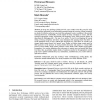Free Online Productivity Tools
i2Speak
i2Symbol
i2OCR
iTex2Img
iWeb2Print
iWeb2Shot
i2Type
iPdf2Split
iPdf2Merge
i2Bopomofo
i2Arabic
i2Style
i2Image
i2PDF
iLatex2Rtf
Sci2ools
IJACT
2008
2008
Securing group key exchange against strong corruptions and key registration attacks
: In Group Key Exchange (GKE) protocols, users usually extract the group key using some auxiliary (ephemeral) secret information generated during the execution. Strong corruptions are attacks by which an adversary can reveal these ephemeral secrets, in addition to the possibly used long-lived keys. Undoubtedly, security impact of strong corruptions is serious, and thus specifying appropriate security requirements and designing secure GKE protocols appears an interesting yet challenging task
| Added | 12 Dec 2010 |
| Updated | 12 Dec 2010 |
| Type | Journal |
| Year | 2008 |
| Where | IJACT |
| Authors | Emmanuel Bresson, Mark Manulis |
Comments (0)

